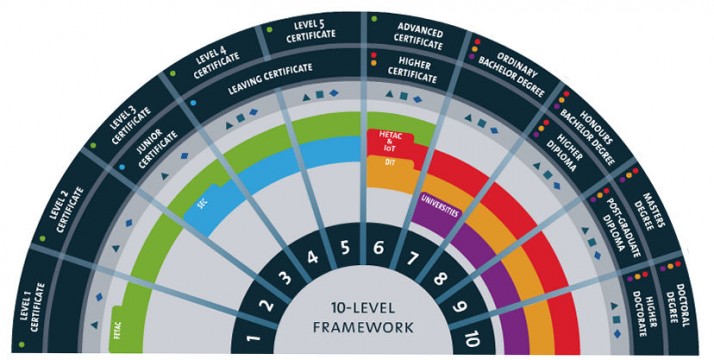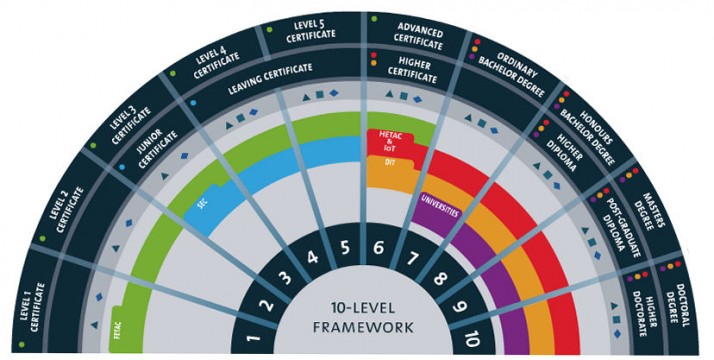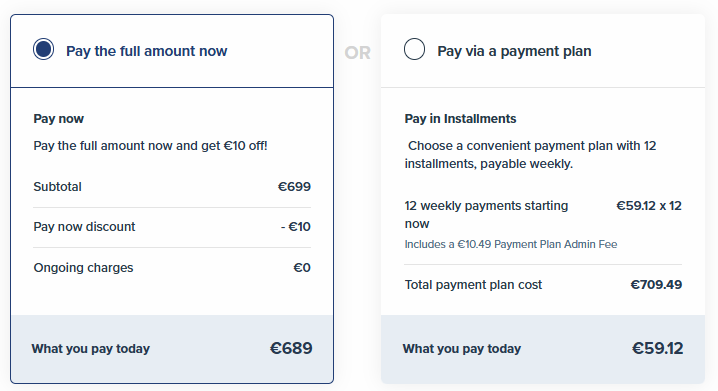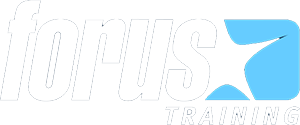
Special Needs Assisting / Assistant (SNA) Level 5 and 6 - Live and Online Course
Standalone or Part of Major Award
If you wish to work as a Special Need Assisting / Assistant (SNA) in a primary or secondary school in Ireland this is the course for you. Most applicants will have completed this programme. This important course will provide you with an in-depth understanding of children with additional needs, the role of a special needs assistant (SNA) and relevant legislation in relation to disability. You will also explore educational options, the rights of children with additional needs, care routines, Individual Education Plans, behaviour management and relationships with children, parents, carers, teachers and multi-disciplinary teams. In addition you will gain knowledge regarding working with children with an additional need and ensuring participation, autonomy, integration, inclusion and equality.
Discover course payment options.
You have two options of payment!
We are flexible and offer two payment options for every course. You can choose choose to pay in installments or pay in full.
WANT TO KNOW MORE ABOUT THIS COURSE?
Check below for more details.
Single modules are the best way to build your path to becoming fully certified and
get recognised by NFQ education point scheme.
This Early Childhood Care and Education Training Course will be suitable for you, should you be new to your role or if you wish to gain this valuable qualification and find a job in this sector.
Access to the Programme
Mature Applicants with relevant life and work experience are welcomed. The Course Advisor is available to meet with prospective learners to discuss and advise on the course details, career and academic opportunities and assess your suitability for the course.
Entry Criteria
Entry criteria / prerequisites Level 5 Certificate / Leaving Certificate (or equivalent) or relevant life experience detailed in a current Curriculum Vitae. Please provide details and attach a copy of either a current CV or Certificate. Learners must be a resident of Ireland / based in Ireland.
English
As this NFQ level 6 qualification is delivered through English it is necessary learners will have sufficient written English skills to complete this course. Forus Training recommends a minimum English language competency of IELTS 5.5 (or equivalent) for successful completion of this programme. If you are not sure what level of English competency you have, please contact hello@forustraining.ie and a Course Advisor will arrange for you to take an assessment.
IT Skills and Equipment Required
Basic working knowledge of computers and access to a computer with internet access is required to do the course. A PC with Windows 8 or later or a Mac with OSX 10.5 or later.
- An internet connection with a speed of at least 10mbps.
- The latest version of Chrome, Firefox, Edge or Safari, set to accept cookies and pop-ups.
- Adobe Flash and Adobe Reader, to view content.
- Word processing software, such as MS Word or Google Docs.
- Some courses include video, therefore your computer must be capable of playing video and sound.
* eLearning and tutor support may vary by course, please check each course page for details.
Reasonable Accommodation
To reinforce inclusion for all our learners we offer customised learning support for individual applicants who require accommodations. Additional Requirements Forus Training provide a range of supports for learners to ensure that our programmes and services are accessible to all.
On application for a course with Forus Training please discuss any additional requirements with the Course Advisor at hello@forustraining.ie so that the appropriate supports for teaching, learning and assessment can be considered. It is important that you discuss your needs with centre staff as early as possible.
Throughout this programme, you will discover how to;
- Evaluate the provision of education for people with special educational needs with reference to current legislation
- Assess the various educational options available in Ireland for people with special educational needs
- Examine relevant theories, skills and processes relevant to curriculum implementation
- Explore the differences between integration and inclusion
- Organise learning opportunities in order to promote independence and responsibility
- Evaluate the importance of the multidisciplinary team in devising Individual Education Plans
- Analyse skills that can be used to aid the teacher in the administration of the national curriculum
- Assess interventions and behavior management techniques that may be used in the learning environment
- Manage meaningful activities that are suited to people¿s needs and connect with their experiences and interests in the learning environment
- Identify strategies for dealing with stressors within the work place
- Provide assistance in the provision of education and care for individuals that present with special educational needs
- Reflect on own attitudes, values , beliefs and assumptions in relation to working with and on behalf of people who present with disabilities
There are 3 options available to you for course delivery. Self-Paced - You can start today Enjoy one to one Trainer support through Zoom, choose whether to have your learner pack posted to your home - (€25 optional if opting for the printed pack). 3 x 30 minute check-in / progress sessions with your trainer. Blended - Learn with a group online Each module is delivered over 7 weeks through a blend of hour long online self directed learning and live Zoom sessions. Your learner pack is posted to your home. Classroom - Traditional location-based training Have the course run at your organisation, book a local training room or attend one of our public courses. Each module is delivered in 3 hour sessions over a period of 7/8 weeks. We can tailor the sessions to your organisational requirements.
WHAT WILL YOU DO ON THIS COURSE?
The Special Needs Assisting Level 5 and 6 - Live and Online course outline can be found below...
6N1957 Special Needs Assisting QQI Level 6 Course
Induction - Before You Start
The Role of the SNA
FIND WHAT PEOPLE SAY ABOUT THIS COURSE.
All the reviews about Special Needs Assisting Level 5 and 6 - Live and Online course
Assessment
The course 6N1957 Special Needs Assisting Online is assessed in the following ways, with the following weighting;
- Project 50%
- Skills Demonstration 50%
Project
A project is a response to a brief devised by the assessor. A project is usually carried out over an extended period of time. Projects may involve research, require investigation of a topic, issue or problem or may involve process such as a design task, a performance or practical activity or production of an artefact or event.
Grading
Pass 50% - 64%
Merit 65% - 79%
Distinction 80% - 100%
Tutor Support
At Forus Training, we have many different supports available for your learning.
Learner Pack
- When you enrol on an online course, you will receive a printed learner pack, posted to you free of charge.
- This learner pack contains clear assessment instructions and comprehensive material to support you as you complete the course.
- The pack will also include induction information as well as forms that you will complete during and at the end of your course.
- The professional online material is fully narrated and transcribed by our trainers for your benefit.
- Each presentation can be completed at a time that suits you and the presentations can be paused and re-watched if necessary. To ensure that the material is memorable, we have developed a short, fun quiz to accompany each online presentation.
- You will also attend live synchronous classes through Zoom and pre-recorded Zoom tutorials will be available to support the material covered.
Trainer Support
- The trainer provides support to learners, including issuing feedback on draft work you will submit. Expect to wait up to 72 hours for a response by email from your trainer. Many of our trainers have full time jobs as well as training with us this means they will have up-to-date sector specific information, but also means that you need to allow a little time for them to get back to you. Our trainers are current with practice in the sector in which they work.
- Trainers can, by appointment, make time available to you before or after class to answer your queries that cannot be covered in the session. They can also make an appointment with you to discuss your work on a telephone call.
Assessment Upload Facility
- We have a user-friendly assessment upload facility available to you..
Support with Preparing for Assessment
If it has been a while since you’ve studied, we have free, short presentations on Study Skills, Academic Writing and Harvard Referencing to assist you in your work.
Technical Support
- Technical support is available by phone to 044 9349400 or by email: hello@forustraining.ie (Monday to Friday : 9am to 5:30pm).
Compassionate Consideration
- Where a Learner, pursuing an award, through no fault of his/her own, is unable to complete their assessment, the exit pathway below is in place to facilitate this Learner with an alternative course. The Learner is given the opportunity to obtain the Award by completing the course at an alternative date/location should they have relocated to an area where we provide the same award.
- The following are examples of circumstances where a Learner is unable to complete their project/their course:
● Bereavement,
● Illness,
● Pregnancy,
● Relocation,
● Extenuating circumstances.
- Please see P9 S7 C6 Compassionate Consideration Policy.
Learner Welfare
- P9 S6 C6 Learner Welfare Policy and practices are fully integrated throughout teaching and learning experiences by both Trainers and staff to effectively meet the health and wellbeing needs of all Learners. The Forus Training welfare policy is focused on the welfare of all Learners and addresses any particular challenges individual Learners may be experiencing during their learning experience. The learning environment includes welfare support provided by staff for Learners which is fully integrated throughout the teaching and learning and organisation of teaching and learning to effectively meet the personal, social (wellbeing) and academic needs of Learners and staff. Please see the policy here P9 S6 C6 Learner Welfare Policy.
Supports for Learners with Disabilities and Specific Learning Difficulties
- Forus Training is fully committed to complying with relevant policies and legislation with respect to equality and disability. Registered and potential Learners with verified disabilities or specific learning difficulties may be given compassionate consideration and reasonable accommodation to enable them to successfully complete their programme. This is arranged by the Course Coordinator.
- A reasonable accommodation is any action that helps to alleviate a substantial disadvantage due to an impairment or medical condition. Such accommodations are put in place to help reduce these barriers in order to provide equality of access and opportunity for all. Reasonable accommodations are made for Learners on a case by case basis and must be supported with medical documentation. Both P9 S2 C6 Evidence of Disability Form and P9 S2 C6A Application Form for Reasonable Accommodation can be found at the following link:
- https://forustraining.ie/knowledge-base/how-do-i-access-reasonable-accomodations/
You will be awarded the certificate 6N1957 Special Needs Assisting - Online. QQI is the awarding body. Forus Training is a provider of education and training programmes and we issue certificates to learners who have reached the standard for a QQI award. The certificate you will receive on successful completion is a formal confirmation by QQI that you have demonstrated the knowledge, skill and competence required to achieve the named award. This Programme is validated by QQI and is coded 6N1957 Online 6N1957 Special Needs Assisting - Online. This certificate which will be issued to you by us is an award listed on the NFQ (National Framework of Qualifications). This ensures the certificate is nationally and internationally recognised and has many potential uses; for example, for further / higher education or employment in Ireland or abroad.
This course leads to a level 6 award on the National Framework of Qualifications. Students who successfully complete this programme may use their credits towards completing a higher level of study in the area of Special Needs Assisting.
Students who successfully complete this Major Award can also use the Certificate as the basis for entry into selected courses in Third Level Colleges and Universities.


Registration can take place through our website, this will involve you completing the relevant application form, providing us with your personal information so we can complete the registration on our side. Registration can also take place by telephone/email/Whatsapp or in person, this will involve you providing us details of the course you wish to study, providing us your payment details and agreeing to proceed with the purchase. By completing registration, you are agreeing to the terms and conditions set out herein.
Please read Terms & Conditions here.
DO YOU WANT TO GET A COURSE BROCHURE?
If you wish to work as a Special Need Assisting / Assistant (SNA) in a primary or secondary school in Ireland this is the course for you. Most applicants will have completed this programme. This important course will provide you with an in-depth understanding of children with additional needs, the role of a special needs assistant (SNA) and relevant legislation in relation to disability. You will also explore educational options, the rights of children with additional needs, care routines, Individual Education Plans, behaviour management and relationships with children, parents, carers, teachers and multi-disciplinary teams. In addition you will gain knowledge regarding working with children with an additional need and ensuring participation, autonomy, integration, inclusion and equality.

What is QQI?
QQI is the state agency responsible for the external quality assurance of further and higher education and training in Ireland.
QQI are responsible for the external quality assurance of further and higher education and training in Ireland.
QQI validate programmes, make awards and are responsible for the promotion, maintenance, development and review of the National Framework of Qualifications (NFQ).
QQI also inform the public about the quality of education and training programmes and qualifications, and advise the Government on national policy regarding quality assurance and enhancement in education and training.











